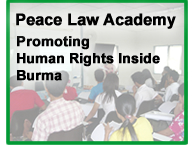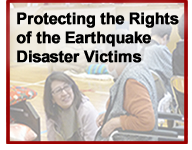3 March 2008
Human Rights Now (HRN), a human rights NGO, carried out an investigation of the human rights situation in Myanmar after the suppression of the pro-democracy movement in September 2007. The investigation was conducted in and around Mae Sot, a town on the border between Thailand and Myanmar.
1. The Human Rights Situation
HRN conducted interviews with more than ten monks and many citizens who participated in protest demonstrations in September 2009. They were in danger of being arrested by the SPDC military regime in Myanmar, because of their participations in the pro-democracy demonstrations and thus were all forced to evacuate Myanmar to Thailand.
Militias such as the Union Solidarity and the Development Association (USDA) and the Swan Arr Shin as well as the military, police and riot police, suppressed the demonstrations. The militias directly attacked monks and citizens, and especially the USDA got into the demonstrations to bring chaos inside and gather information as spies, and played a crucial role in identifying participants of the demonstrations.
The SPDC detained approximately 4,000 participants in the demonstrations. While over 3,000 of them have been released, approximately 700 are still being detained. More than 1,100 political offenders were in custody before the demonstrations in Myanmar. At present, the number of people detained due to participations in political activities is over 1,800.
Insein Prison is known as the worst prison for political offenders. An estimated 96 monks and 10 nuns have been in detention in the prison. Those monks' robes have been ripped off and they have been beaten. They have also not been allowed to meet family visitors. They have been in custody only because they joined in peaceful actions and over 300 of them have been prosecuted. Despite criticism by the international community after the SPDC's suppression of the demonstrations, the disastrous human rights situation has not improved.
2. The Situation of Refugees
Protection as refugees has not been granted to monks and citizens who were politically persecuted as mentioned above and evacuated to the Thai boarder. No procedure to conduct refugee status determination exists at the national level and the procedure at the regional level has been halted since December 2006.
Although those persecuted have been harbored temporarily by civilian organizations, they are in dead-end situations. Monks are forced to choose to work, forsaking their faith, or to go hungry since they were prohibited to have means of livelihood except dedications in Myanmar.
HRN hopes that the Thai authorities protect those persecuted as refugees as soon as possible and maintains that it is important for the international community, including civil society, to support those persecuted. In particular, the Japanese government should introduce a resettlement system immediately, and accept and protect those politically persecuted by the SPDC and people from ethnic minority groups who were forced to leave their home country due to persecutions and armed conflicts. When those people come to Japan and apply for refugee status, the Japanese government should also protect them as refugees.
3. A Referendum and a General Election in Myanmar
First, there is a serous problem about the legitimacy of the process since a constitution has been drafted and a general election is to be conduced without the participation of those democratically elected in the 1990 election.
Second, in terms of a constitution drafting, a serious problem exists concerning the contents of the draft. According to the draft constitution, those married with foreigners have no eligibility in the election. It means that Aung San Suu Kyi, a pro-democracy leader, has been completely excluded from the process of the general election. A total of 110 out of 440 members of parliament have to be nominated by the military and thus, the process cannot be regarded as involving efforts toward genuine democratization. Moreover, the draft constitution recognizes human rights, which are granted only under the current laws, and there is a very high risk of continuing human rights violations such as detention of numerous political offenders based on oppressive laws after the enactment of the constitution.
Third, in the process of a referendum and a general election, it is hard to say that voluntary voting and free election campaigns are guaranteed and therefore, it is extremely difficult to hold a fair referendum and general election in the present circumstances. The Referendum Act announced recently criminalizes behaviors and activities which hinder referendums, and there is a high risk of the criminalization of all activities which question the legitimacy of the constitution proposed by the SPDC.
In addition, it is impossible to expect that the election returns will be determined in a fair manner if a general election is carried out without any guarantees of freedom and the abolition of the oppressive laws which justify the detentions of a number of pro-democracy demonstrators.
As stated above, if the referendum over the constitution proposed by the SPDC and the general election are conducted, there is very high risk of failure to achieve genuine democracy. The process of drafting and confirming of the constitution has to be carried out based on dialogue with the pro-democracy movement and ethnic minorities as many pro-democracy detainees, including Aung San Suu Kyi, have been under house arrest are released.
At the Fifth Special Session in October 2007, the UN Human Rights Council adopted a resolution calling for the release of all pro-democracy detainees and for dialogue with all parties concerned toward democratization. The unilateral constituent process by the SPDC is in direct opposition to the concurrent will of the international community as described in the Human Rights Council resolution.
The international community has to oppose in concert the enforcement of the process by the SPDC rather than remain on the sidelines. HRN calls for the Japanese government as an Asian country and a Human Rights Council member elected from the Asian region, to express clear opposition to the SPDC's policies and to play more active roles to achieve democratization in Myanmar.







